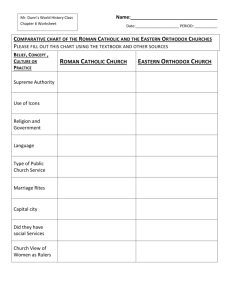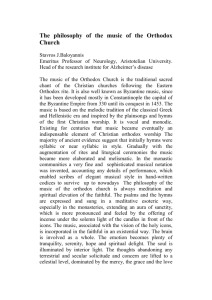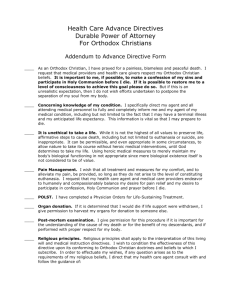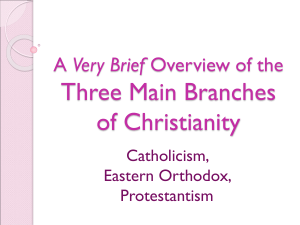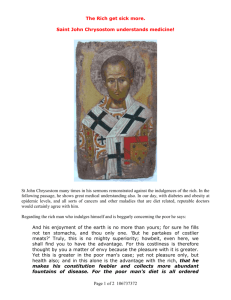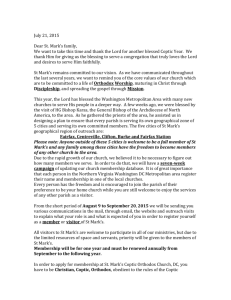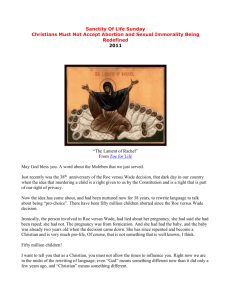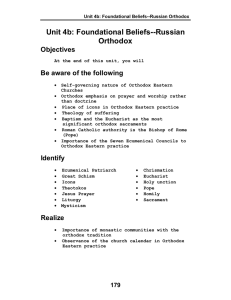2014 01 January Summary
advertisement
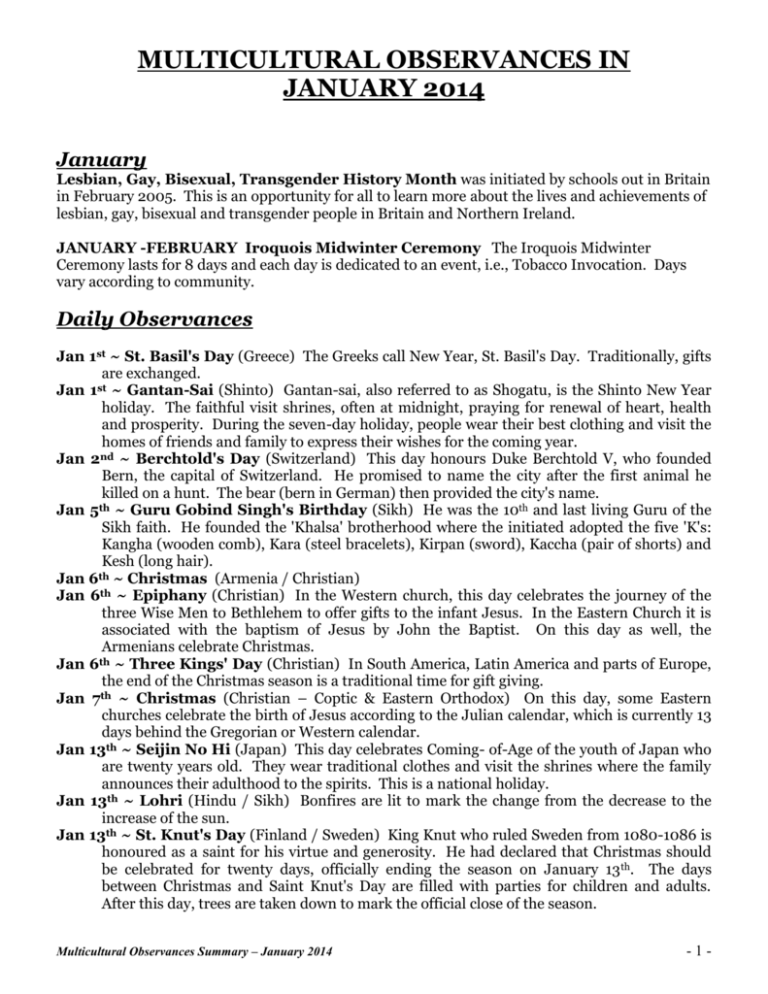
MULTICULTURAL OBSERVANCES IN JANUARY 2014 January Lesbian, Gay, Bisexual, Transgender History Month was initiated by schools out in Britain in February 2005. This is an opportunity for all to learn more about the lives and achievements of lesbian, gay, bisexual and transgender people in Britain and Northern Ireland. JANUARY -FEBRUARY Iroquois Midwinter Ceremony The Iroquois Midwinter Ceremony lasts for 8 days and each day is dedicated to an event, i.e., Tobacco Invocation. Days vary according to community. Daily Observances Jan 1st ~ St. Basil's Day (Greece) The Greeks call New Year, St. Basil's Day. Traditionally, gifts are exchanged. Jan 1st ~ Gantan-Sai (Shinto) Gantan-sai, also referred to as Shogatu, is the Shinto New Year holiday. The faithful visit shrines, often at midnight, praying for renewal of heart, health and prosperity. During the seven-day holiday, people wear their best clothing and visit the homes of friends and family to express their wishes for the coming year. Jan 2nd ~ Berchtold's Day (Switzerland) This day honours Duke Berchtold V, who founded Bern, the capital of Switzerland. He promised to name the city after the first animal he killed on a hunt. The bear (bern in German) then provided the city's name. Jan 5th ~ Guru Gobind Singh's Birthday (Sikh) He was the 10th and last living Guru of the Sikh faith. He founded the 'Khalsa' brotherhood where the initiated adopted the five 'K's: Kangha (wooden comb), Kara (steel bracelets), Kirpan (sword), Kaccha (pair of shorts) and Kesh (long hair). th Jan 6 ~ Christmas (Armenia / Christian) Jan 6th ~ Epiphany (Christian) In the Western church, this day celebrates the journey of the three Wise Men to Bethlehem to offer gifts to the infant Jesus. In the Eastern Church it is associated with the baptism of Jesus by John the Baptist. On this day as well, the Armenians celebrate Christmas. th Jan 6 ~ Three Kings' Day (Christian) In South America, Latin America and parts of Europe, the end of the Christmas season is a traditional time for gift giving. th Jan 7 ~ Christmas (Christian – Coptic & Eastern Orthodox) On this day, some Eastern churches celebrate the birth of Jesus according to the Julian calendar, which is currently 13 days behind the Gregorian or Western calendar. Jan 13th ~ Seijin No Hi (Japan) This day celebrates Coming- of-Age of the youth of Japan who are twenty years old. They wear traditional clothes and visit the shrines where the family announces their adulthood to the spirits. This is a national holiday. Jan 13th ~ Lohri (Hindu / Sikh) Bonfires are lit to mark the change from the decrease to the increase of the sun. Jan 13th ~ St. Knut's Day (Finland / Sweden) King Knut who ruled Sweden from 1080-1086 is honoured as a saint for his virtue and generosity. He had declared that Christmas should be celebrated for twenty days, officially ending the season on January 13th. The days between Christmas and Saint Knut's Day are filled with parties for children and adults. After this day, trees are taken down to mark the official close of the season. Multicultural Observances Summary – January 2014 -1- MULTICULTURAL OBSERVANCES IN JANUARY 2014 Jan 14th ~ Eid-Maulad-un-Nabi (Islam) Birthday of Prophet Muhammad. Since no one really knows when Mohammad was born, the date of his death has been adopted as the day of his birthday. It is observed differently in the various Muslim countries for 9 days, with colourful fairs, parades and feasting. Jan 14th ~ Pongol (India) A three-day rice harvest festival in South India is celebrated with a cultural evening of song and dance. Jan 14th ~ New Year (Eastern Orthodox Christian – Coptic & Eastern Orthodox) The Eastern Orthodox Christians include Bulgarian Orthodox, Georgian Orthodox, Greek Orthodox, Macedonian Orthodox, Russian Orthodox, Romanian Orthodox and Serbian Orthodox. Jan 14th ~ Makar Sankranti (India / Hindu) The transition of the Sun from Sagittarius to Capricorn during the winter solstice in the Northern hemisphere is known as Makar Sankranti. The days gradually lengthen in the Northern hemisphere. Jan 16th ~ Tu B'Shevat – Arbor Day (Jewish) This day celebrates Judaism's roots in the Natural world. It is a holiday and known as the New Year for Trees. Special meals include eating the seven fruits of the land – wheat, barley, figs, grapes, pomegranates, olives and dates. Trees are also planted. Jan 17th ~ Thaipoosam Cavadee (India) Celebrated by Hindus of Tamil origin in honour of Kartikeya, Granter of Wishes and the second son of Shiva. Devotees with their tongues, cheeks and body pierced with needles, hooks and skewers, dance their way trance-like to the temple carrying the 'Cavadee' – a wooden arch covered with flowers with a pot of milk at each end of its base. Jan 19th ~ Timkat / Theophany (Christian – Coptic & Eastern Orthodox) The Eastern Orthodox Church associates Theophany with the baptism of Jesus by John the Baptist. Jan 19th ~ Sultán – 17th Month (Bahá'i) The first day of the seventeenth Bahá'i month. The English translation of Sultán (Arabic) is Sovereignty. Jan 20th ~ Martin Luther King, Jr. Day (USA) This day commemorates the leader of the 'Civil Rights' movement in USA. People of all races and religions have benefited from the sacrifices and accomplishments made by this great man. He was a Nobel Prize winner (Peace Prize 1964) and a prominent advocate of non-violent protest. He was assassinated on April 4th, 1968. Jan 24th ~ Kitchen God Celebration (China) The custom is based on the traditional farewell ceremony for T’sao Wang, Prince of the Oven, before he leaves for his annual trip to heaven to report on families’ good behaviour during the year. Jan 25th ~ Robert Burns' Night (Scotland) Robert Burns' Night honours Scotland's national poet, born in 1759. The night is celebrated by the Scots with a sit down 'Burns Supper' with speeches, poetry and song. Jan 30th ~ Greek Education Day (Greece) It is the anniversary for St. John Chrysostm, St. Basil and St. Gregory the Great who are honoured for their ancient knowledge combined with Christian Beliefs. Jan 31st ~ Chinese New Year (Buddhist, China, Hong Kong, Taiwan, Vietnam) The year of the Horse. This is the year 4712 in the Chinese Lunar calendar and the most important holiday. It is a three-day holiday in China and Hong Kong. The Chinese clean and decorate their homes with the 5 lucky signs of happiness; new clothes are worn and even the poorest buy new shoes, for it is considered bad luck to step down on the ground into old shoes. Vietnamese call it the “Tet’ Festival. Jan 31st ~ Solnai (Korea) This is the biggest event of the year. 15 days after Solnai on the first full moon day, Koreans eat a five-grain meal and pray for a bountiful harvest. Multicultural Observances Summary – January 2014 -2-
